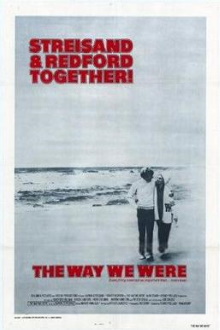Barbra Streisand’s song should be familiar to just about everyone but far fewer people should have watched the film it was made for. The film itself is quite highly regarded but I have difficulty saying that I enjoyed watching it. Yet I am blown away by its boldness and how it is in effect a brilliant transposition of the usual gender roles in a romantic film. I want to like it so much but it is held back by the very fact that it remains at its heart a romantic film.
In university in the 1930s, Katie Morosky is a vocal pro-Communist activist from a working class background who is so passionate and serious in her advocacy that she is made fun. Hubbell Gardiner is good-looking Anglo-Saxon Protestant who is popular on campus and likes to enjoy life. Despite their differences they are attracted to each other. Katie is drawn by Hubbell’s good looks and impressed by his short story describing how life comes easy to him. Hubbell is intrigued by Katie’s dedication even if he thinks she takes it too far. Nothing happens to them in school but they run into each other during World War II and Katie pursues Hubbell aggressively. They soon become a couple though Katie is still annoyed by Hubbell’s circle of upper class friends. After the war, Hubbell’s writing takes him to Hollywood where he tries to be a scriptwriter by adapting his novels for the screen. Katie however thinks that Hubbell is demeaning his art in this way and their relationship is further tested by her determination to remain defiant McCarthyism takes hold in Hollywood.
Through flashbacks and time skips, the events here covers a decent span of time, yet it feels that nothing much happens. The problems and disagreements in Katie and Hubbell’s relationship are the same ones from the very beginning, over and over again. It’s just that they persevere and keep going, mainly because Katie tries so hard. As my wife notes, it’s tough to watch Katie all but beg Hubbell to stay with her when it is so clear that none of their fundamental conflicts are being resolved. They have happy moments, sure, but Hubbell is such a passive character that it feels that he is just coasting along for the ride. The film has little in the way of dramatic arcs and it becomes increasingly difficult to understand why Katie tries so hard or why she loves Hubbell so much. Yet when the end comes, as it inevitably must, it’s such a shock to the audience even though both of them seem resigned to it. Apparently this film went through writing hell as many different writers worked on the script and this shows in the film. This is indeed a romantic drama but maybe it never should have been one in the first place.
From a meta perspective, it makes more sense to think of it as a gender inversion of the usual tropes. A story featuring an intelligent but relatively unattractive man aggressively pursuing a beautiful but relatively uninteresting woman would be hardly worth remarking on at all, yet we would feel that he deserves to get the girl. Here with the gender roles reversed, it comes across as being disturbing and that itself says something about our expectations in that it seems normal for a talented man to desire a woman purely for her beauty but a waste for a woman to desire a man purely for his looks. It’s a fascinating cultural phenomenon but I’m not certain if either the director Sydney Pollack or the many scriptwriters involved deliberately intended it this way. Even in a modern romantic film, such an imbalanced relationship would not be acceptable as we expect both partners to be equally deserving and committed.
In the end, I feel that this film mostly shows up the constraints of the romance genre. The romantic relationship itself must be the focus of such a film, yet having established Katie as such a passionate and determined activist, it’s such a disservice to her character that she would put all that on hold because she loves Hubbell. As Hubbell himself states, Katie made a mistake because he was never the person she thought he was. The two of them may have had their moments but he was never going to be anything more than a pleasurable but temporary distraction in her life. Meanwhile left outside of this film are the parts of her that truly are important: her activism, her principles and so on. So the right kind of film to make about her would not be a romantic film at all. That’s why this doesn’t feel enjoyable to watch at all but it is very interesting to think about.
